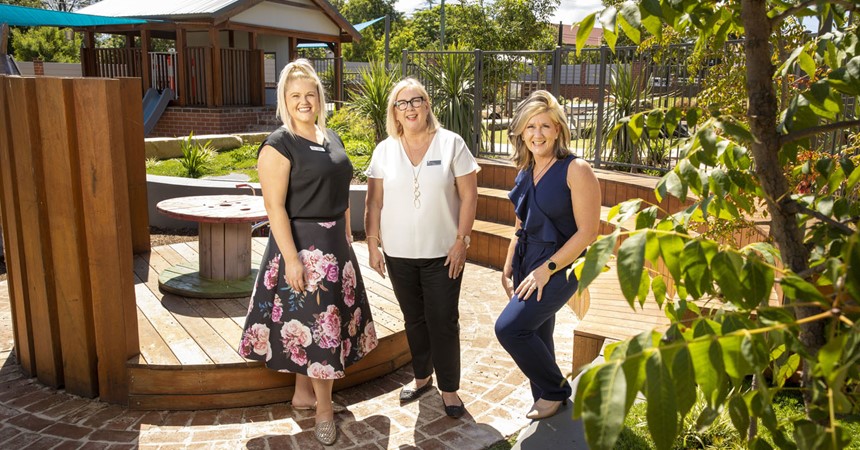It comes 12 months after the Diocese of Maitland-Newcastle, through its St Nicholas Early Education agency, set about developing a vocational training arm.
In January 2019, Sonia Liddiard took up the opportunity to assist St Nicholas Early Education establish vocational training. With almost three decades in vocational education and training (VET), Ms Liddiard is a passionate advocate for the sector.
Within months of Ms Liddiard coming on board, St Nicholas Pathways was launched, and she is now operations manager for the program.
At the time, Diocese of Maitland-Newcastle chief executive Sean Scanlon, said the Pathways initiative would create “meaningful pathways to employment” and, “support the growing demand for early childhood educators”.
Ms Liddiard and Mr Scanlon suspected the Pathways program would be popular, but the response the training initiatives have received from students, the NSW government, and industry partners, has exceeded their expectations.
The first program St Nicholas Pathways launched was the School-based Apprentice Traineeship (SBAT). Following its success an application was made to the NSW government to support St Nicholas Pathways’ Industry Immersion program. This program is designed to run over a series of weeks and provide Year 10 students with an introduction to the early childhood and care profession.
The NSW Minister for Skills and Tertiary Education, Geoff Lee, supported the Diocese’s plans, saying investment in education and training is critical to the success of the state’s economy. He says the program will empower Hunter students to make informed decisions about their future and underpin development of a skilled workforce.
“The NSW government is committed to helping our students transition from school to work and make sure they are on a right pathway to a job or further education while they are still at school,” Mr Lee said.
When applications for the program first opened at the beginning of this year, St Nicholas Pathways was poised to undertake a marketing campaign to promote enrolments, but staff quickly realised there was no need.
“Our goal was to offer the program to nine groups of about 12-15 students, over the course of Term 2, Term 3 and Term 4,” Ms Liddiard said. “We sent a flyer to local Catholic, public and independent schools and were flooded with enquiries. It was only a matter of weeks until we reached capacity.”
And while implications arising from COVID-19 may delay the start, nothing will dampen the enthusiasm of Pathways staff to get the program up and running as soon as it safe and practicable to do so.
As part of the program, students will engage in practical and study opportunities within a fully functional play-session environment, based out of St Nicholas’s purpose-built facility in Maitland.
“The Industry Immersion program, which includes daily interaction with children and families, is designed to give students a taste for what it’s like to work in the sector,” Ms Liddiard said.
St Nicholas Early Education’s general operations manager, Kerri Armstrong, says having this type of insight is beneficial for students as they begin to seek training and employment opportunities, and gives employers confidence that applicants have a realistic understanding of the industry.
“Working in early education involves far more than simply childcare,” Ms Armstrong said.
“Employees who do well in this industry will inspire a love of learning for the children they engage with, through gaining knowledge in development and curriculum. Most importantly, they’ll also embody the ability to communicate effectively, use their initiative and operate as part of a team.”
Accordingly, Ms Armstrong and Ms Liddiard have been working together to ensure all these components are incorporated into the program, as well as information about future opportunities in the early education profession.
And, according to the Minister, the clearer understanding students have of further training and employment prospects, the better.
“At the heart of these programs is the NSW government’s desire to improve career advice, increase school-based apprenticeships and traineeships,” Minister Lee said. As such, the NSW government supports the program and there are no costs for students to participate.
Year 10 students who enjoy their industry immersion experience and are considering a career or further training in early childhood education are encouraged to apply for the St Nicholas Pathways SBAT program, delivered in partnership with the International Child Care College (ICCC) RTO ID 90018). The SBAT program provides Year 11 students with an opportunity to undertake a school-based apprenticeship, delivering them with entry-level qualifications in Early Childhood Education and Care, which can then be used to gain a diploma and/or towards an undergraduate degree in a Bachelor of Education. Applications for the SBAT Program open in Term 3 and though beneficial, it is not a prerequisite that students have taken part in the immersion program to be successful in their application.
“I truly believe in the essence and intent of VET courses and the meaningful opportunities they provide young adults as future workforce participants,” Ms Liddiard said.























































































